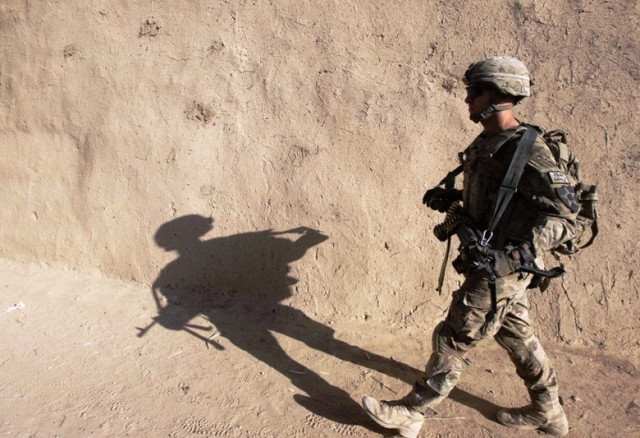White House would consider Afghanistan ‘zero’ option
Obama would consider a plan for post-2014 Afghanistan that would leave no American troops in the country.

US and international forces anticipate ending combat missions in Afghanistan this year. PHOTO: REUTERS/ FILE
Officials however stressed that Obama, mulling how quickly to draw down US soldiers from the country, would not be guided by specific future troop levels, but would decide the fate of the American presence based on strategic needs.
Asked whether Obama would consider a scenario in which all US troops left and there was no residual force in Afghanistan, Ben Rhodes, a deputy national security advisor said: "That would be an option we would consider."
"We wouldn't rule out any option. We are not guided by the goal of a certain number of troops in the country. We are guided by the objective that the president has set," Rhodes told reporters Tuesday.
Obama's goals are to ensure that Afghanistan's new national army has the capacity and equipment to defend itself and to ensure that Al-Qaeda cannot make a post-war comeback and again find safe haven.
Ahead of the meeting with Karzai, reports citing US defense sources have put forward a range of possible plans – including the "zero option" for the residual level of the American commitment to Afghanistan.
Rhodes said Obama "is focused on how do we most successfully achieve our core objectives while bringing the war to an end by the end of 2014, as the president and his allies and the Afghans have committed to do."
He added that the administration's "core goal" is "to disrupt, dismantle, and defeat al Qaeda, and to ensure that they can never return to Afghanistan and use it as a safe haven from which they could launch attacks against the United States or our allies."
The Wall Street Journal reported late last week that the Pentagon had prepared plans for a smaller presence in Afghanistan at the insistence of the White House.
The newspaper said the plans now prepared by the Pentagon call for leaving roughly 3,000, 6,000 or 9,000 US troops in the country.
The presence of US troops in Afghanistan after 2014 will also have to be governed by a status of forces agreement, which Obama and Karzai are expected to discuss at their talks at the White House on Friday.
A White House statement said the US president looks forward to "discussing our continued transition in Afghanistan, and our shared vision of an enduring partnership between the United States and Afghanistan."
US and international forces anticipate ending combat missions in Afghanistan this year, before moving to a training role with local forces until the end of 2014.
The Afghan leader has expressed support for keeping US troops in Afghanistan but sensitive details – including immunity for American soldiers and the transfer of detainees into Afghan custody – are still under negotiation.
Karzai's relationship with Washington has been troubled in recent years and there are fears that attention for Afghanistan, heavily dependent on international aid, could plummet after 2014, plunging it back into political turmoil.
The conflict has become increasingly unpopular in the United States, but some lawmakers in Washington have accused Obama of pushing for a hasty exit.
During his four-day trip in the US, Karzai is also meeting with a number of other high-level officials, for talks his office said would focus on security, economic and political transition, equipping and strengthening Afghan forces, efforts to negotiate peace with Taliban-led insurgents and a security agreement with the United States.
Karzai kicked off his US trip by visiting his wounded spy chief, Asadullah Khalid, at an American hospital on Tuesday.



















COMMENTS
Comments are moderated and generally will be posted if they are on-topic and not abusive.
For more information, please see our Comments FAQ